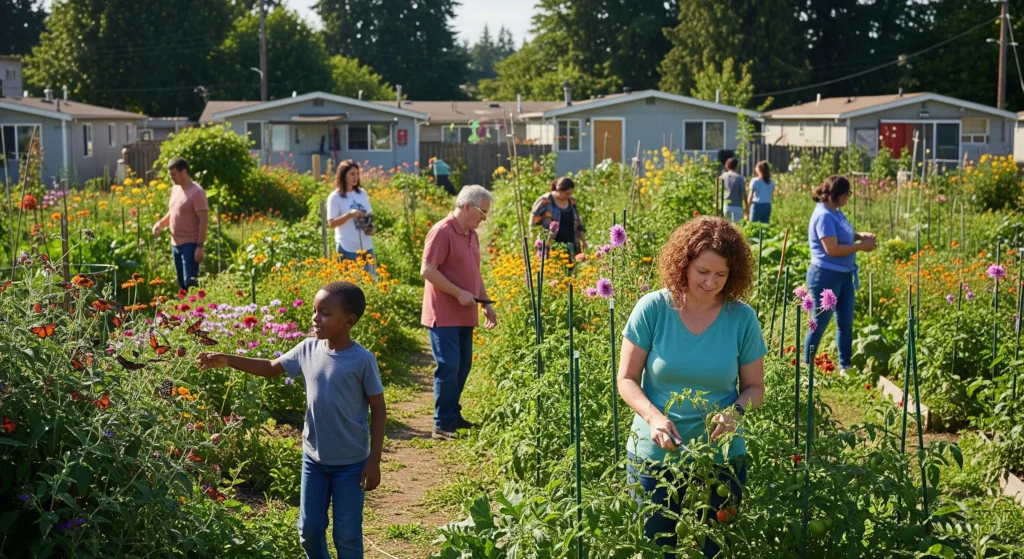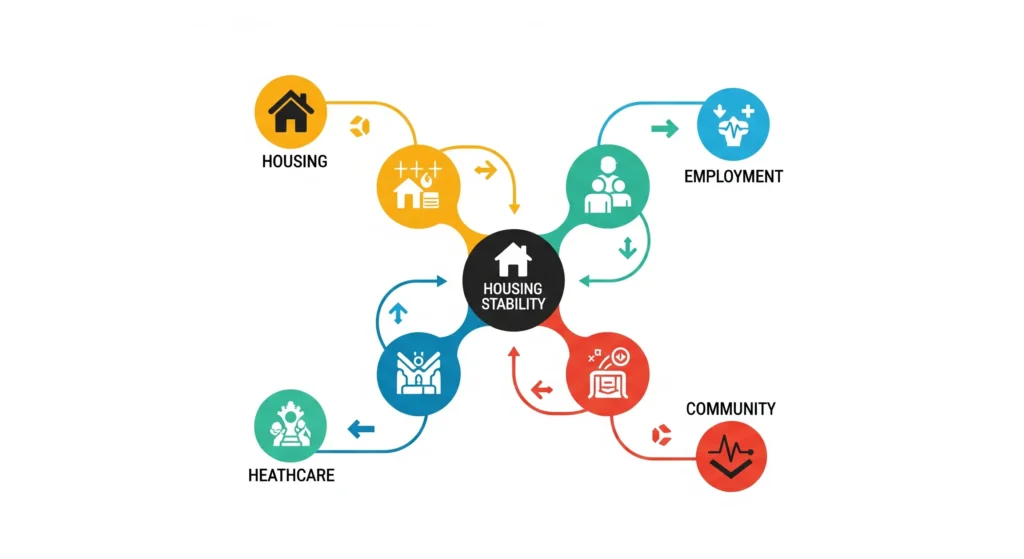Finding Stability in Washington’s Housing Landscape
Let’s be real – finding affordable housing in Washington State feels like searching for a unicorn sometimes. Whether you’re dealing with a tight budget, going through a divorce, or just trying to keep your family housed, the struggle is real. Trust me, you’re not alone in this fight.
The housing assistance Washington state offers can be a lifeline, but navigating all the options. That’s where things get tricky. Here’s the thing: Washington’s housing affordability crisis isn’t just a number on a chart – it’s affecting real people every single day. In many counties across the state, there simply aren’t enough affordable and available housing units for every 100 low-income renter households who need them. It’s what experts call the “Affordable Housing Gap,” and honestly, it’s pretty frustrating.
But here’s my promise to you: this guide isn’t going to leave you hanging. We’re going to walk through every resource, every eligibility requirement, and every step of the application process to help you find safe and secure housing. Because everyone deserves a place to call home, and there’s more help available than you might think.
Understanding the Types of Housing Assistance Washington State Available
Alright, let’s break down what’s out there. Housing assistance in Washington state comes in several flavors, and understanding the differences can save you tons of time and headaches.
Subsidized Housing Inventory
First up, let’s talk about subsidized units. These are basically apartments or homes where the government helps cover some of the cost, making them more affordable for folks with lower incomes. Now, here’s the catch – not all subsidized units have the same income eligibility requirements. Some are stricter than others, so don’t assume you won’t qualify just because of your income level.
You’ve probably heard of Section 8 housing vouchers or Section 515 rural housing programs. These are real game-changers for many families. Just keep in mind that some of these programs had contracts set to expire around 2017 in certain areas, so the availability might have shifted. It’s always worth checking what’s currently available in your specific area.
Immediate Housing Needs vs. Long-Term Stability
Here’s something super important to understand: there’s a big difference between emergency housing help and long-term housing solutions. If you’re in crisis mode right now – maybe you’re about to be evicted or you’re literally without a place to sleep tonight – you’ll want to focus on immediate resources like warming shelters or emergency housing programs.
But if you’re thinking ahead and want to secure stable housing for the long haul, you’ll be looking at permanent housing programs. These might take longer to access, but they’re designed to give you that stability you’re craving.
Rent Assistance Programs
This is where housing assistance Washington state shines. Multiple programs offer direct financial help with your rent. Some cover a portion of your monthly payment, while others might help with security deposits or the first month’s rent. These programs can be absolute lifesavers when you’re trying to get back on your feet.
Housing Grants
Don’t overlook housing grants – they’re free money to help with housing costs. These grants might cover moving expenses, security deposits, or even help with rent. The best part? You don’t have to pay them back like you would with a loan.
New Protections for Renters
Here’s some good news: Washington State signed new protections for renters receiving housing assistance into law back on March 15, 2018. These protections help ensure that landlords can’t discriminate against you just because you’re using housing assistance. It’s a step in the right direction, and it means you have more options when looking for housing.
Key Organizations and Resources for Housing Assistance

Okay, let’s get down to the nitty-gritty. Who exactly can help you navigate the housing assistance Washington state has to offer? There are tons of organizations out there, and knowing where to start can make all the difference.
State-Level Entities
Washington State Housing Finance Commission is like your research headquarters. These folks are the go-to source for understanding what programs are available statewide. They’ve got their finger on the pulse of housing assistance programs across Washington.
The Washington State Department of Commerce is heavily involved in homelessness initiatives. If you’re dealing with homelessness or at risk of becoming homeless, they’re worth connecting with.
Local Public Housing Authorities (PHAs)
Here’s a pro tip: contacting your local Public Housing Authority should be one of your first moves. These are the folks who actually manage a lot of the housing programs in your specific area. They know what’s available right now, what the waitlists look like, and what documents you’ll need. Every county has one, and they’re usually pretty helpful once you get them on the phone.
Non-Profit Organizations: Your Comprehensive Support Network
This is where things get interesting. Many non-profits don’t just help with housing – they offer a whole support system that can help you get back on your feet in multiple ways.
M.H.A. Speak Out Speak Up is pretty amazing. They provide FCS Housing/Employment services, housing grants, employment and trade connections, and mental health resources. What I love about them is that they’re all about connecting people to various life needs – housing, food, clothing, education, and employment. Even if they don’t provide a specific service directly, they’ll help you find someone who does through their community connections.
Love Overwhelming offers emergency shelter services, peer support, and harm reduction programs. Their whole philosophy is that hope develops when people are supported, which, honestly, I think is beautiful. They provide both housing assistance and rent assistance in Washington State, and they really get that people need more than just a roof over their heads.
Washington Health Outreach has compiled a list of several organizations that are doing incredible work:
- Compass Housing Alliance is all about developing and providing essential services and affordable housing in the Puget Sound region. They’re particularly great if you’re in the Seattle area.
- Plymouth Housing focuses specifically on permanent homes and comprehensive support for people experiencing long-term homelessness. They understand that some folks need more intensive support to maintain stable housing.
- Catholic Community Services and Catholic Housing Services serve low-income individuals, families, seniors, and those with special needs. They offer resident support services, which means they don’t just help you get housing – they help you keep it.
Referral Services
Washington 2-1-1 services are like having a personal assistant for finding resources. Just dial 2-1-1 and they’ll connect you with housing assistance, food programs, healthcare, and pretty much any other service you might need. It’s free, available 24/7, and honestly, it’s one of the best-kept secrets in Washington state.
How to Assess Your Family’s Housing Needs (Pre-Application)
Before you start filling out applications left and right, let’s take a step back and figure out what you need. This might seem obvious, but trust me, thinking through these details upfront will save you time and help you target the right programs.
Location Matters More Than You Think
Where you live affects everything else in your life. Think about proximity to public transportation – if you don’t have a car, you’ll need to be near bus routes or light rail. Consider how close you’ll be to essential services like grocery stores, schools, and your workplace. Sometimes, a slightly more expensive place that’s well-located can save you money in the long run.
School District and Child Care Considerations
If you’ve got kids, this is huge. Moving might mean changing schools, which can be tough on children, especially if they’re already dealing with other changes like divorce. Look into the school ratings in different areas, and don’t forget about daycare options if you have younger children.
Size and Space Requirements
Think realistically about how much space you need. If you’re going through a divorce with split custody arrangements, you might need an extra bedroom even if the kids aren’t with you full-time. Consider your lifestyle and what kind of space will work for your family.
Budget Reality Check
This is probably the most important factor. Be honest about what you can afford, including all the hidden costs like moving expenses, deposits, and utility connections. If you’re dealing with a post-divorce financial situation, your budget might be completely different from what it was before. Factor in everything, and don’t forget to account for things like renters’ insurance and parking fees.
The Application Process: Step-by-Step Guidance

Alright, here’s where the rubber meets the road. The application process for housing assistance Washington state can feel overwhelming, but breaking it down into steps makes it way more manageable.
Gather Your Information and Documents
This is crucial, and honestly, it’s the step that trips up most people. You’ll need to have your paperwork game on point. Here’s what you’ll typically need:
- Valid ID (driver’s license, state ID, or passport)
- Proof of income (pay stubs, benefit statements, tax returns)
- If applicable, your divorce decree
- Custody agreements (if you have children and they’re part of a custody arrangement)
- Social security cards for everyone in your household
- Birth certificates for all children
- Bank statements
- Any documentation of disabilities or special needs
Pro tip: Make copies of everything and keep them organized in a folder. You’ll be submitting these documents multiple times, and having everything ready to go will make your life so much easier.
Research Programs That Fit Your Situation
Don’t just apply to everything, hoping something will stick. Take time to visit the websites of the organizations I mentioned earlier and create a list of programs that align with your situation. Some programs are specifically for families, others for seniors, and some for people with disabilities. Targeting your applications will increase your chances of success.
Complete Applications Carefully
Most organizations offer online applications now, which is convenient, but also means you need to be extra careful. Fill out every section accurately – don’t leave things blank or put “N/A” unless it’s truly not applicable. If you’re unsure about something, call and ask. Many organizations have housing counselors who can help you through the process, and there’s often legal aid available if you need more support.
Submit Supporting Documents Properly
This might seem basic, but make sure all your documents are clear and legible. If you’re scanning documents, check that they’re readable before submitting. Follow the submission instructions exactly – some organizations want documents emailed, others want them uploaded to a portal, and some still want physical copies mailed. Keep copies of everything for your records, including confirmation emails or receipts.
Understand the Waitlist Reality
Here’s the tough truth: Many affordable housing programs have waitlists because demand is so high. This doesn’t mean you shouldn’t apply – it just means you need to be strategic. Apply to multiple programs, keep track of where you’ve submitted applications, and follow up regularly. Sometimes people move or their situations change, so waitlists do move.
Beyond Housing: Holistic Support Services
Here’s what I love about many housing assistance programs Washington state – they understand that stable housing is just one piece of the puzzle. Many organizations offer additional support services that can help you maintain long-term stability.
Case Management
Having someone in your corner who understands the system can be incredibly valuable. Case managers provide personalized support to help you navigate challenges, connect with resources, and stay on track with your goals. They’re like having a knowledgeable friend who knows all the ins and outs of available services.
Job Training and Employment Connections
Many housing assistance programs in Washington state recognize that stable employment is crucial for maintaining stable housing. They offer job training programs, help with resume writing, interview skills, and connections to employers who are hiring. Some even provide work clothes and transportation assistance to help you get started.
Mental Health Support
Let’s be honest – housing instability is stressful, and stress affects your mental health. Many programs offer access to mental health resources, including crisis hotlines (you can always call 988), peer-led support lines like the Warmline, Trans Lifeline, and Wildflower Alliance Peer Support Line. Some organizations even offer Mental Health First Aid training, which can be helpful for both you and your family.
Substance Abuse Prevention and Recovery
If substance abuse is part of your story, many housing programs offer specialized support. This might include recovery programs, Narcan training, and peer support groups. The approach is usually focused on harm reduction and meeting people where they are, rather than requiring you to be “perfect” to receive help.
Food and Clothing Assistance
Housing assistance often comes with connections to food banks and meal programs. Some organizations also help with clothing, especially work clothes, if you’re starting a new job. These services can free up money in your budget for other necessities.
Legal Aid
Legal issues can be a barrier to stable housing, whether it’s dealing with evictions, family law matters, or public benefits. Many housing programs offer legal aid services or can connect you with lawyers who specialize in these areas.
Mentoring and Parent Support
Some programs offer mentoring relationships that can provide encouragement and guidance as you work toward your goals. For parents, there are often parent support networks that offer hope, guidance, advocacy, and camaraderie, especially for parents of children receiving mental health or substance use services.
Tips for Maximizing Your Chances
Let me share some insider tips that can really make a difference in your housing search.
Be Persistent but Polite
The squeaky wheel gets the grease, but don’t be annoying about it. Follow up on your applications regularly, but be respectful of people’s time. A friendly check-in every couple of weeks is usually appropriate.
Keep Detailed Records
Track every application you submit, including dates, contact information, and any follow-up communications. This will help you stay organized and ensure you don’t miss important deadlines or opportunities.
Don’t Put All Your Eggs in One Basket
Apply to multiple programs and keep your options open. The more applications you have out there, the better your chances of finding something that works for your situation.
Ask for Help When You Need It
Don’t try to navigate this alone. Housing counselors, case managers, and legal aid lawyers are there to help. Use their expertise – that’s what they’re there for.
Stay Flexible
Sometimes the perfect housing situation isn’t immediately available, but something that works for now might be. Consider temporary solutions that can provide stability while you continue looking for your ideal situation.
Keep Your Information Updated
If your situation changes – you get a new job, your income changes, or your family size changes – make sure to update your applications. This could affect your eligibility or priority status.
Moving Forward with Hope and Support

Look, I’m not going to sugarcoat it – finding housing assistance Washington state can be challenging, and the process can feel overwhelming. But here’s what I want you to remember: every single person and family deserves safe, secure housing. It’s not too much to ask for, and it’s not something you should have to feel guilty about needing help with.
The resources I’ve outlined in this guide are there because people in your community care about you and want to see you succeed. The organizations, the programs, the funding – it all exists because there are people who believe that with the right support, everyone can find stability and hope.
So here’s my challenge to you: take the first step. Maybe that’s calling your local Public Housing Authority, dialing 2-1-1, or visiting the website of one of the organizations I mentioned. Start somewhere, and remember that every small step forward is progress.
You’ve got this. Washington state has resources, and there are people ready to help you access them. Your journey toward stable housing starts with that first phone call, that first application, that first step toward asking for help.
Don’t wait – the sooner you start, the sooner you’ll find the stability you’re looking for. Your future self will thank you for taking action today.
Housing assistance Washington state is real, it’s available, and it’s there for people exactly like you. Now go out there and claim what you deserve – a safe, secure place to call home.